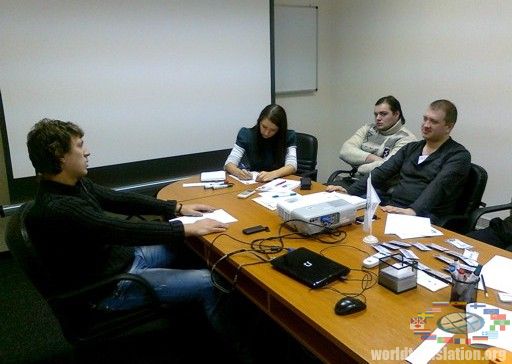Active listening

Active listening - the kind of communication during which you show respect and consideration for the interlocutor, his words and emotions.  While listening actively, you show your communication partner your interest. This attitude will be rewarded handsomely. Its quite difficult to learn the skills of active listening, but if you will succeed, they will become just a magic wand for you both in the family and work (especially in working with people), in education and so on. This is the best way to speak with someone in his own language. People will treat you better, because what could be better than someone's sincere interest in our modest person? In addition, you can better understand your family, in fact you want this, isn't it?
While listening actively, you show your communication partner your interest. This attitude will be rewarded handsomely. Its quite difficult to learn the skills of active listening, but if you will succeed, they will become just a magic wand for you both in the family and work (especially in working with people), in education and so on. This is the best way to speak with someone in his own language. People will treat you better, because what could be better than someone's sincere interest in our modest person? In addition, you can better understand your family, in fact you want this, isn't it?
So, there are various techniques of active listening.
• Figuring. Our formation as a person is going on throughout life. This process is unique and depends on a large number of factors that affect us. You will not find two identical people in the whole world. So if you think that you understood the words of the interlocutor, its not a fact that it is so. Here will be useful figuring. Your partner says something and look forward to your response. And for what? He tells you about Thomas, and you to him.... In order not to begin to talk about what is interesting to you, clarify what he needs (unless you are going to communicate, not to talk about yourself). To do this, use the clarifying questions, find out what he (she) has in mind.
Our formation as a person is going on throughout life. This process is unique and depends on a large number of factors that affect us. You will not find two identical people in the whole world. So if you think that you understood the words of the interlocutor, its not a fact that it is so. Here will be useful figuring. Your partner says something and look forward to your response. And for what? He tells you about Thomas, and you to him.... In order not to begin to talk about what is interesting to you, clarify what he needs (unless you are going to communicate, not to talk about yourself). To do this, use the clarifying questions, find out what he (she) has in mind.
• Verbatim repetition.  You just repeat the words of the interlocutor in an assertive form. If you ask a question, it can create a feeling of curiosity, and not of sincere interest and sympathy. Using repetition, you can fill the pause. You will have a few seconds to think about what was said. In addition, sometimes we having heard the words from the side, suddenly realize that said stupidity. And also, repeating the words of your opponent, You very clearly show that attentively listen to him (as in it was in the school, "The fourth desk: what I just said?").
You just repeat the words of the interlocutor in an assertive form. If you ask a question, it can create a feeling of curiosity, and not of sincere interest and sympathy. Using repetition, you can fill the pause. You will have a few seconds to think about what was said. In addition, sometimes we having heard the words from the side, suddenly realize that said stupidity. And also, repeating the words of your opponent, You very clearly show that attentively listen to him (as in it was in the school, "The fourth desk: what I just said?").
• Rephrasing.  Repeat in your own words the information, which interlocutor said. So again, you will fill out the pause and give yourself time to think, show all your attention and interest to what was said and to the speaker, and also get the opportunity to make sure that everything understood correctly. This technique is used when it is difficult to repeat word for word what interlocutor said. You can start with the phrase "Do I understand correctly, that...?", Or "if I understand correctly, then...". There are other phrases, remember them.
Repeat in your own words the information, which interlocutor said. So again, you will fill out the pause and give yourself time to think, show all your attention and interest to what was said and to the speaker, and also get the opportunity to make sure that everything understood correctly. This technique is used when it is difficult to repeat word for word what interlocutor said. You can start with the phrase "Do I understand correctly, that...?", Or "if I understand correctly, then...". There are other phrases, remember them.
• Interpretation.  The most complex form of active listening. But if you will master it, you just will be the best in skill of persuasion. Interpretation can be advantageous and disadvantageous for you. For example, we often interpret the behavior of the people close to us, as inattention, poor attitude. Kind of interpretation depends on the level of our self-esteem. Many have to train in yourself the ability to the positive interpretation. To others its given "from birth".
The most complex form of active listening. But if you will master it, you just will be the best in skill of persuasion. Interpretation can be advantageous and disadvantageous for you. For example, we often interpret the behavior of the people close to us, as inattention, poor attitude. Kind of interpretation depends on the level of our self-esteem. Many have to train in yourself the ability to the positive interpretation. To others its given "from birth". All these methods of active listening can learn to use. It is better to train each method separately. For example, during the week as much as possible try to use repetition to analyze the passed day for unused situations, and so on. You will quickly feel the effect of these exercises. I hope that your life will improve!
All these methods of active listening can learn to use. It is better to train each method separately. For example, during the week as much as possible try to use repetition to analyze the passed day for unused situations, and so on. You will quickly feel the effect of these exercises. I hope that your life will improve!